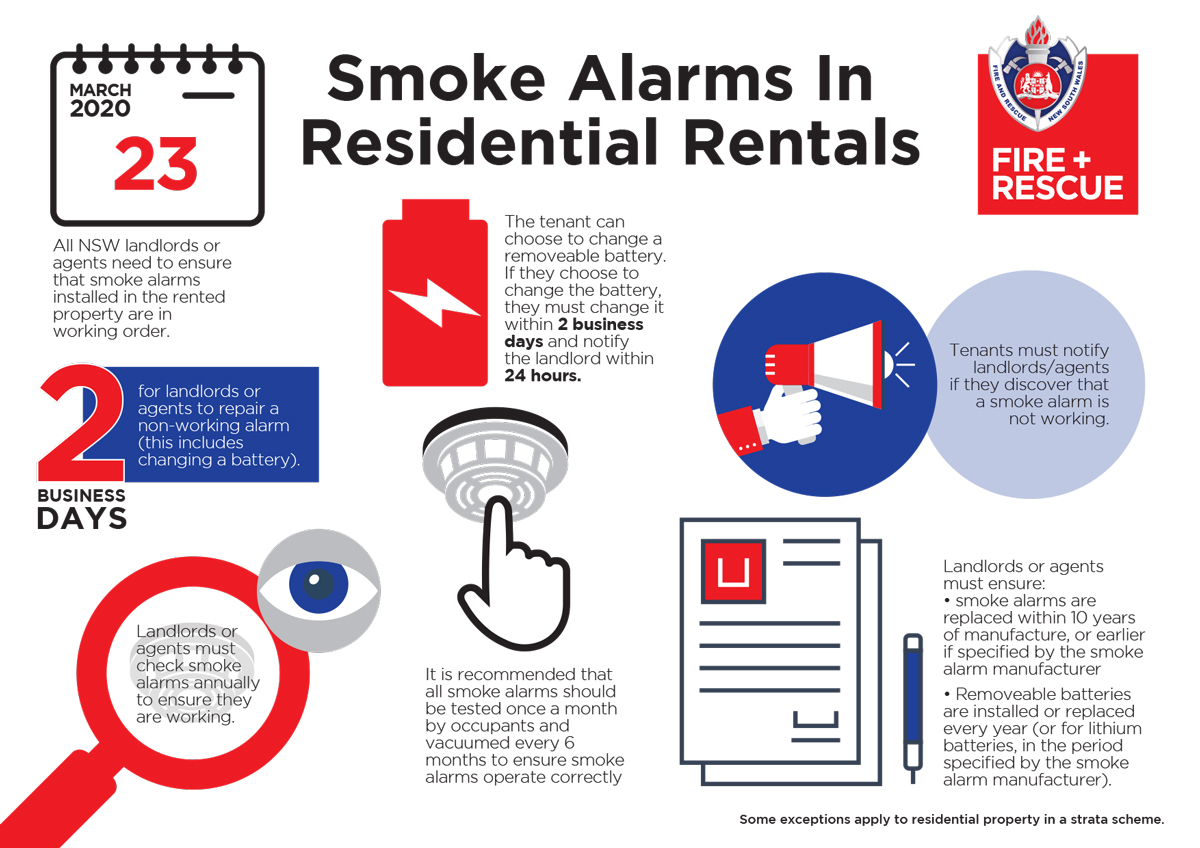Fire safety in your rented home
Eloise Parrab • 23/12/2020
Olivia Nielsen-Gurung
As we are heading back into the bushfire season in NSW we thought it would be a good time to remind us all on how to ensure our homes are bushfire prepared and general fire safety in the home. NSW Rural Fire Service volunteer and previous Eastern Area Tenants Service coordinator, Hayley Stone, wrote a blog post this time last year where she provided some guidance on what tenants could do to try and ensure their homes were prepared for bushfires. You can read her blog post here.

Support for communities impacted by the bushfires
As we are all aware the bushfires in late 2019 and early 2020 were devastating for many communities in NSW. Many tenants are still dealing with the fall out from these fires and many people who owned their own homes which were damaged have become tenants. In response to this ongoing impact the Tenants Union has expanded our advice line and are prioritising tenants who live in bushfire impacted areas. We encourage you to contact our advice line and talk to an advocate if you need tenancy advice.
As Hayley’s blog points out it can be overwhelming as a tenant when you live in a bushfire prone area because a lot of the bushfire risk reduction strategies are aimed at property owners and require extensive modifications to the property that are out of reach for renters. Some of Hayley’s practical tips for tenants to get their homes prepared for bushfires include trimming overhanging branches where possible, keeping lawns mowed and putting all green waste (leaves and lawn cuttings) into the green bin, clearing gutters where possible and storing gas bottles away from the house.
Working smoke alarms save lives
Any kind of fire that affects our homes can be devastating and as a response to this the law in NSW changed in March this year to strengthen general fire safety in rental properties. House fires can be caused by faulty electrical appliances, open fires and heaters, or unattended cooking - and there are a range of ways in which you can manage risks or try to reduce fire hazards in your home. Fundamental to managing risk is a working smoke alarm. Smoke alarms are essential to ensuring home fire safety: they give an early warning in the event of fire and ensure you have a chance to get out of the property and to a safe location.
Landlords' now have greater responsibilities to make sure smoke alarms in rental properties are functional. Since 2006, it has been mandatory in NSW to install smoke alarms in all buildings where people sleep but the requirement on landlords to ensure they were working was not mandatory. The provisions in the Residential Tenancies Act 2010 (the Act) on smoke alarms have been overhauled and there are now big penalties for landlords and Agents if they fail to make sure that smoke alarms in a rental property or boarding house are working.
These changes have come about due to a coronial case investigating a death in a house fire in a rental property in Sydney in 2016. A nine year old girl died in the fire and the Coroner found that the Real Estate Agent managing the property was aware the smoke detectors in the property were not working at the time of the fire. The Coroner made a number of recommendations as part of her findings and this included changes to tenancy legislation in NSW.
Your rented home must have working smoke alarms
In good news for tenants the Act is now very clear about a landlord’s responsibilities when it comes to ensuring that smoke alarms are in working order. The landlord is required to:
- perform annual checks to ensure all smoke alarms installed at the property are in working order
- replace removable batteries in all smoke alarms in the period specified in the manufacturer's guidelines (for a removable lithium battery), or otherwise annually
- repair or replace a smoke alarm that is not working within 2 days of becoming aware that it is not working, this includes changing a battery
- replace a smoke alarm with a new smoke alarm within 10 years or earlier if specified by the smoke alarm manufacturer

As we all know often when you report issues to your Agent or landlord it can take some time for them to take steps to deal with the problem. This can be problematic and potentially life threatening if your smoke alarm is not working. In some situations the tenant can replace the smoke alarm and/or battery if the landlord doesn't do so within 2 business days. It will depend on a number of factors including whether its battery or hard wired alarms and whether your premises are part of a strata scheme. If you are in a position where under the Act you can replace the alarm and or battery then you are also entitled to be reimbursed for your expenses related to this within 7 days. If you would like to find out how the Act applies to your home you can check out our factsheet or get in contact with your local tenants advice service.
Unfortunately if you are a public housing tenant, a tenant of the Aboriginal Housing Office or a community housing tenant where the Land and Housing Corporation (LAHC) is responsible for maintaining the property you are not completely covered by these new laws. Despite the need for LAHC to improve their systems and address fire hazards and risks after at least one person died in a fire in a public housing property last year they were granted an exemption to one of the new smoke alarm provisions until after 23rd March 2021. So currently LAHC are exempt from the requirement to replace smoke alarms every 10 years or according to the manufacturer instructions whichever is soonest. DCJ Housing is currently undertaking a Fire Safety Program to ensure their properties will comply once the exemption lapses. We encourage social housing tenants from 24 March 2021 to get in contact with their social housing provider to find out if their smoke alarm has been replaced in compliance with the Act.
The rules are a little bit different if you live in a block of apartments or units then there are extra requirements related to fire safety. The building's owner or strata scheme is required to submit an annual fire safety statement every year. This statement is provided to the local council and Fire and Rescue NSW and certify that all fire safety measures work properly. It must be signed by a fire safety competent practitioner. The statement must be displayed prominently within the building for example on the foyer noticeboard. If you haven't seen this statement or its out of date then we suggest you raise this with your landlord or Real Estate Agent.
Reducing the risk: if you're worried raise concerns
Regardless of if you are a social housing tenant or private tenant, a tenant living in a strata managed building or resident of a boarding house, it is true that you have less available options when it comes to protecting your home from fire. As we approach another hot summer in NSW it might be a good time to raise any concerns you may have about fire safety and the property you live in.
Useful resources
Some good sources of information about fire safety and your home include:
- NSW Fair Trading resource smoke alarm requirements for rented homes
- NSW Rural Fire Service Bushfire Survival Plan
- NSW Rural Fire Service Bushfire Info Line 1800 679 737
- NSW Rural Fire Service Twitter
- Air quality reports



